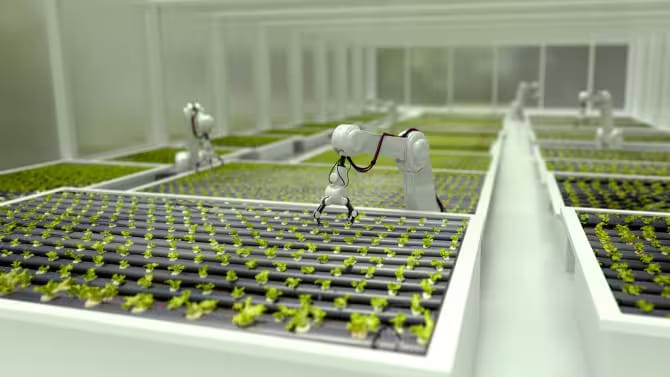- Climate.Online
- Posts
- Why Hardware Companies Are Key Players in the Climate Tech Revolution?
Why Hardware Companies Are Key Players in the Climate Tech Revolution?
Welcome to climate.online!
Dear Climate Change Innovators,
We're thrilled to welcome you to climate.online, your new go-to resource for cutting-edge insights in ESG and climate tech.
In a world where environmental challenges are increasingly urgent, staying informed and connected is more crucial than ever. That's why we've created climate.online – to bridge the gap between environmental consciousness and technological innovation.
What can you expect from us?
1. Curated Content: Dive into carefully selected articles, research papers, and industry reports that matter most to ESG professionals and climate tech innovators.
2. Expert Insights: Gain valuable perspectives from thought leaders, entrepreneurs, and scientists who are shaping the future of sustainable business and green technology.
3. Market Trends: Stay ahead of the curve with our analysis of emerging trends in climate tech, sustainable finance, and ESG investing.
4. Innovation Spotlights: Discover groundbreaking startups and technologies that are revolutionising the fight against climate change.
5. Policy Updates: Navigate the complex landscape of environmental regulations and global climate agreements with our concise policy briefings.
6. Networking Opportunities: Connect with like-minded professionals and potential collaborators through our exclusive events and forums.
As an early subscriber, you're not just joining a newsletter – you're becoming part of a community dedicated to driving positive environmental change through innovation and sustainable practices.
We're committed to delivering high-quality, actionable content that will empower you to make informed decisions and drive impact in your professional sphere.
Thank you for being part of this journey from the very beginning. Together, we can accelerate the transition to a sustainable, low-carbon future.
Stay tuned for our inaugural issue, coming soon to your inbox!
Warm regards,
The climate.online Team
P.S. We value your input! Feel free to reply to this email with any topics you'd like us to cover or features you'd like to see in future issues.
Why Hardware Companies Are Key Players in the Climate Tech Revolution?

To make a real impact on climate change, hardware startups that have spent years developing and validating their technologies are the most likely candidates, according to a report from Congruent Ventures and Silicon Valley Bank. Specializing in sectors like energy or raw materials is a key advantage.
The report gathered insights from over 50 experts across academia, finance, and industry, resulting in a list of 50 North American startups divided into four categories: agriculture and food; energy, buildings, and mobility; manufacturing; and materials. Manufacturing and materials companies dominated the list with 18 entries, followed by energy startups with 13. Agriculture and food startups were underrepresented despite the sector's significant contribution to carbon emissions, highlighting an opportunity for new ventures in this space. Most of the startups focus on hardware, bucking the software preference of many generalist venture capitalists.
It's not surprising that climate tech startups are primarily hardware-focused. Climate change is a physical problem, and while software can make small improvements, it can’t address fundamental reliance on fossil fuels if the hardware remains unchanged.
The average startup on the list is seven years old and has raised $374 million, though this figure is skewed by heavily funded companies like Commonwealth Fusion Systems and Impossible Foods. The median startup, by contrast, is six years old and has raised $114 million. The difference between the mean and median reflects the divide in the “commercialization valley of death,” where early-stage companies struggle to fund the leap from proven concept to commercial viability. In the report, 28% of startups raised under $50 million, while the same percentage exceeded $500 million. Successful companies are often rewarded by investors once they overcome commercialization challenges.
Climate tech startups typically take longer to develop than software companies because they must prove their scientific basis and build complex hardware. While climate-focused hardware investments may seem risky to non-specialist investors, the potential rewards are substantial. The market for climate tech, valued at $1 trillion, is projected to double every decade, and companies that succeed in reducing emissions could capture a significant share of this growing market, benefitting both the companies and their investors.
Unlocking the Future: The Climate Tech Fund Focused on Industrial Decarbonization

In the first half of 2024, climate tech investment reached $11.3 billion, a 20% drop from the same period in 2023, according to Statista. Venture capital funding in climate tech has been declining since its peak in 2021, reflecting broader market trends where investors have become more cautious due to global uncertainties.
However, the climate tech investment landscape is evolving. The sector is gaining a larger share of the investment market as more investors, talent, and founders join the effort to combat climate change.
"Globally, climate tech now represents more than 10% of total private equity and venture capital investments, capturing a growing slice of a shrinking market," said Namratha Kothapalli, principal at Speedinvest. She noted that more ambitious entrepreneurs and academics are launching climate-focused businesses, and more investors are exploring the climate space. Kothapalli expects this momentum to persist.
An example of this trend is Visionaries Tomorrow, a European climate tech fund formed to address industrial decarbonization. Launched within Visionaries Club, a VC firm connecting industrial giants with startups, the fund focuses on solving the challenges of decarbonizing the industrial sector. Its backers include unicorn founders and influential industrial families, who not only invest but also facilitate connections between startups and large-scale clients for rapid growth.
Thong Le Hoang, Co-founder of Visionaries Tomorrow, remains optimistic about the climate tech investment landscape. "Access to capital, both equity and non-dilutive funding, is still robust. For instance, BlackRock and Temasek recently announced a $1.4 billion climate tech fund, and over $80 billion in climate tech VC funding has become available in the past six months. Initiatives like the Inflation Reduction Act and the EU Innovation Fund are also boosting support."
Sebastian Pollok, Founding Partner of Visionaries Tomorrow, agrees, calling it an excellent time to launch a climate tech startup. He believes the sector is at a pivotal moment, with innovators and industry leaders recognizing the urgent need for change, alongside increased government backing and funding opportunities.
Diageo Partners to Boost Climate-Resistant Farming in East Africa

Diageo, the global beverage company known for brands like Johnnie Walker and Guinness, has announced partnerships with three innovative companies to tackle farming challenges in Sub-Saharan Africa, which have been worsened by climate change. Diageo has committed up to $570,000 to develop and test advanced agricultural monitoring technologies.
Unveiled on September 5, 2024, these partnerships aim to support smallholder farmers by providing technologies that offer better insights into soil and crop health. The goal is to help farmers adapt to unpredictable weather patterns, such as droughts and floods, which have significantly impacted harvests in the region.
John Cant, Head of Diageo Sustainable Solutions, emphasized the importance of the initiative: "Smallholder farmers in Africa face significant challenges due to climate change and water scarcity. By working with partners, we aim to find solutions that maximize their farm output and reduce uncertainty, ultimately increasing their income while providing Diageo with quality ingredients for our products."
Diageo’s three new partners bring unique solutions:
AquaSpy: A cloud-based IoT agriculture platform that offers detailed insights into crop root systems and soil conditions, helping farmers make better planting and resource management decisions.
Clean Crop Technologies: A proprietary seed surface treatment that boosts germination and strengthens crop resilience against extreme weather conditions like droughts or floods.
Smart Cloud Farming: Provides precision soil maps through advanced soil scanning, enabling accurate crop yield forecasting and data-driven farming decisions.
The initial pilot programs will take place in Kenya and Uganda, with plans to expand these technologies across Diageo’s African supply chain if successful.
This initiative is part of Diageo's broader sustainability efforts, which have included 14 previous pilot projects. One standout project involved working with EXXERGY and the Ardagh Group to develop a glass coating that reduces emissions and resource use by allowing for thinner glass without sacrificing strength.
We hope you find climate.online to be an invaluable resource as you navigate the rapidly evolving world of ESG and climate tech. Your journey towards making a lasting impact starts here, and we’re excited to support you every step of the way.
As we move forward, remember that your insights and feedback are crucial in shaping the future of this platform. Together, we can push the boundaries of what’s possible, fostering innovation that not only addresses today’s environmental challenges but also creates a more sustainable tomorrow.
Thank you for your commitment to driving positive change. We’re thrilled to have you on board and can’t wait to see the difference we can make together.
Best regards,
The climate.online Team